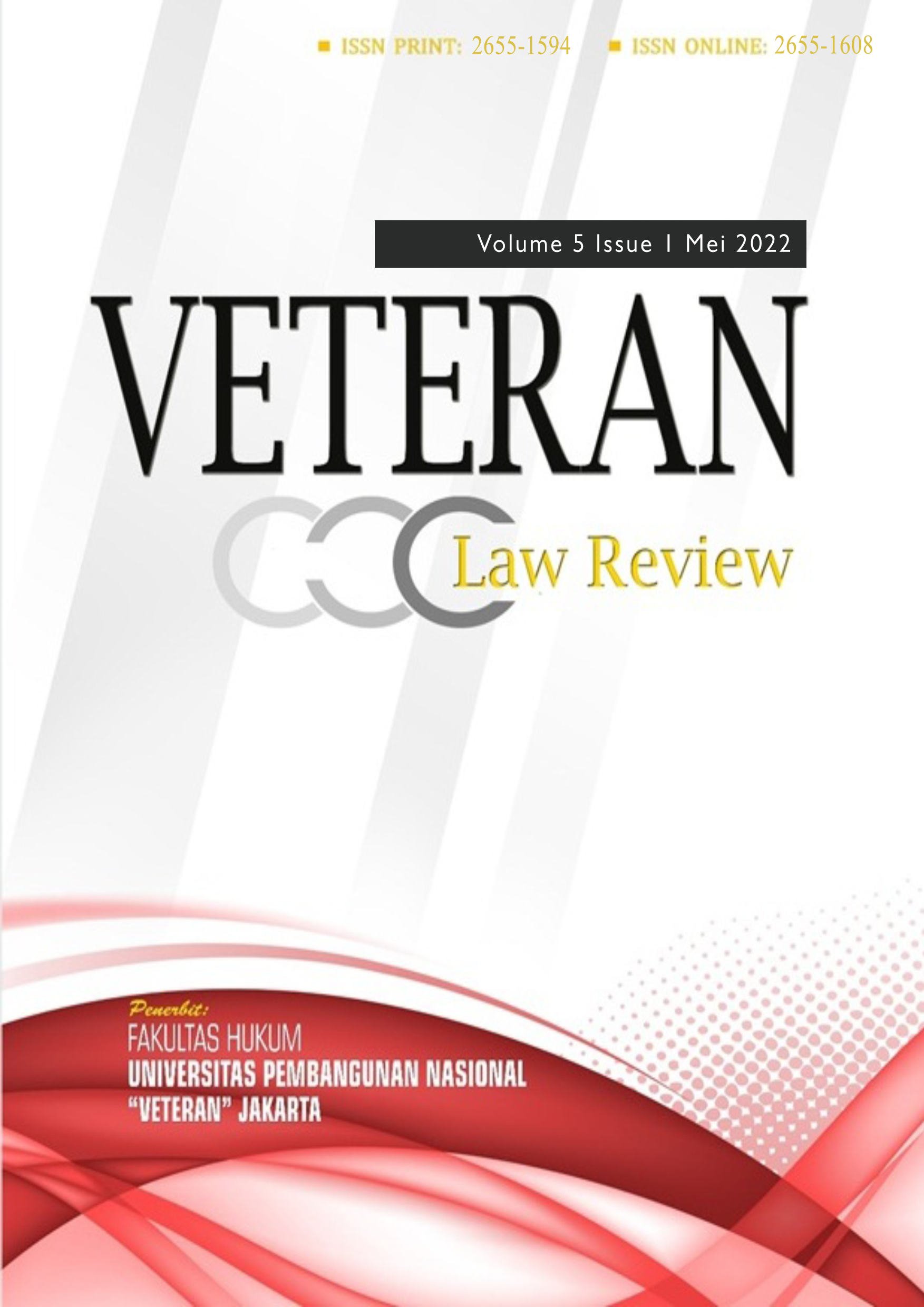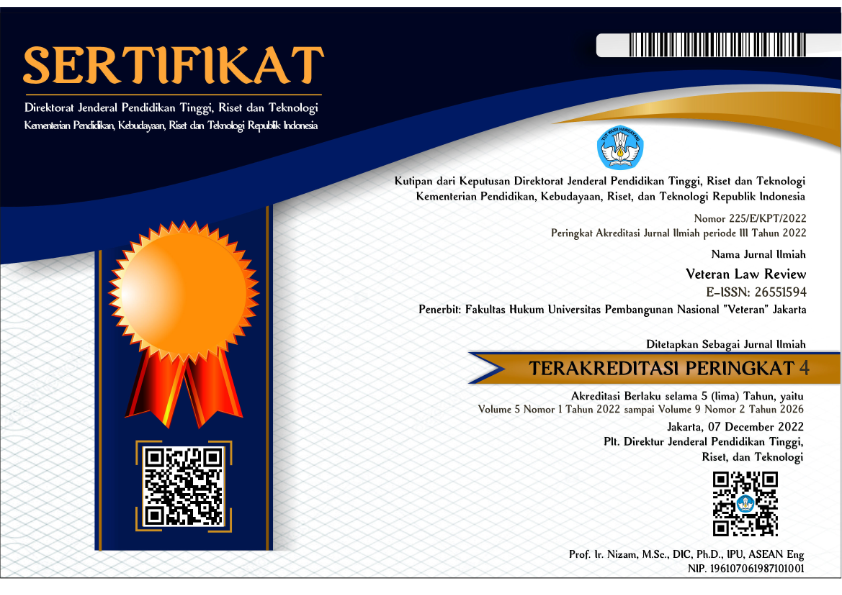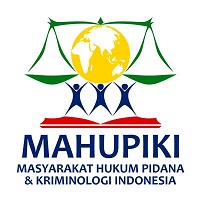Optimizing The Role Of The Indonesian National Army In Addressing The Crime Of Terrorism
DOI:
https://doi.org/10.35586/velrev.v5i1.4306Keywords:
Countermeasures, Optimization Role, Terrorism, TNI,Abstract
The role of the Indonesian National Army (Tentara Nasional Indonesia “TNI”) in countering terrorism is part of the strategy to combat terrorism. With the escalation of the threat of terrorism which not only threatens national security, but also state sovereignty, the involvement of the TNI is a necessity in order to defend the country from threats or terrorist attacks. This study describes the urgency of the TNI's involvement in efforts to overcome acts of terrorism that threaten state sovereignty, and how the ideal role of the TNI in efforts to combat criminal acts of terrorism is described. The method used in this research is normative legal research, using a statutory approach (statute approach) and a conceptual approach (conceptual approach). The results of this study indicate that there is a need for regulations that clarify the main tasks and functions of the TNI in combating terrorism. The proposed efforts to involve the TNI in counter-terrorism include aspects of enforcement and prevention. In the aspect of prosecution, the technical involvement of the TNI in counter-terrorism operations is at the back, when the Anti-Terror Detachment 88 is in a condition beyond over capacity and the gradation of threats that endangers the sovereignty of the state. In the prevention function, the role of the TNI is more focused on the effective use of intelligence forces in supporting the prevention of criminal acts of terrorism. Technically, the role of the TNI that must be carried out is early warning, early prevention, and prosecution and restoration of an area as a result of acts of terrorism.Downloads
References
Books:
Amarullah, A. (2011, Juli 28). Kebijakan Formulasi Pendanaan Terorisme dalam Hukum Pidana Indonesia.
Atmasasmita, R. (2000). Pengantar Hukum Pidana Internasional. PT Rafika Aditama.
Basuko, S. E. (t.t.). Peran TNI Angkatan Darat dalam Mendukung Ketahanan Nasional (Studi tentang Kegiatan Pembinaan Teritorial di Jajaran Komando Teritorial TNI angkatan Darat,. https://library.ui.ac.id/detail?id=120589&location=lokal
Golose, Petrus Reinhard, Deradikalisasi Terorisme: Humanis, Soul Approach, dan Menyenuh Akar Rumput, (2009) Jakarta: Yayasan Pengembangan Kajian Ilmu Kepolisian
Handling Penanganan Terorisme Sebagai Tindak Pidana Khusus (Extra Ordinary Crime). (2004, Juni 28).
Hendropriyono, Terorisme “Fundamentalis Kristen, Yahudi, Islam”, (Jakarta: Kompas, 2009)
Soerjono Soekanto and Sri Mamudji, (2014), Penelitian Hukum Normatif Suatu Tinjauan Singkat, 16th Publication, PT Rajawali Pers
Soerjono Soekanto, Pengantar Penelitian Hukum, Jakarta: Universitas Indonesia Press, 1986
Yusgiantoro. P, Ekonomi Pertahanan : Teori dan Praktek, Jakarta: Gramedia Pusataka Utama, 2014
Lexy J. Moleong, (2011), Metode Penelitian Kualitatif, XXIX Publication, Remaja Rosdakarya, Bandung
Journals:
Abu Rokhmad, Radikalisme Islam dan Upaya Deradikalisasi Paham radikal, Jurnal Walisongo, Volume 20, No. 1, Tahun 2002
Brian Jenkinsen, “International Terorism” in The Use of Force, edited by Robert Art and Keneth Waltz, 5 edition, MD: Rowman et Littlefield, Lanham., 1999
Chandarapatriana, A. (2016). “Peranan Tentara Nasional Indonesia Angkatan Darat (Tni Ad) Dalam Menghadapi Ancaman Yang Bersifat Militer Dan Nonmiliter Di Wilayah Negara Kesatuan Republik Indonesia.” Jurnal Online Mahasiswa (JOM) Bidang Ilmu Hukum, 1(1), Article 1. https://jom.unpak.ac.id/index.php/ilmuhukum/article/view/8
Departemen Pendidikan dan Kebudayaan RI, Kamus Besar Bahasa Indonesia, (1989), Jakarta: Balai Pustaka
Department of Defense and State Security. (2015). Buku Putih Pertahanan. Department of Defense. https://www.kemhan.go.id/wp-content/uploads/2016/04/BPPI-INDO-2015.pdf
Donald Philip Verene, “International Terorism and the Human Condition”, The Pluralist Volume 2, Number 3, 2007
Eko Sabar Prihatin, Polisi dan Terorisme (Masalah Keamanan yang Dihadapi Polisi Saat Ini), Masalah-Masalah Hukum, Majalah Ilmiah Fakultas Hukum Universitas Diponegoro, Volume 33, No. 4, 2004.
Fitriliani, Y. (2013). JURISDIKSI NEGARA DALAM KEJAHATAN TERORISME. ADIL: Jurnal Hukum, 4(1), 207–224. https://doi.org/10.33476/ajl.v4i1.34
Herdiansah, A. G., Ummah, K. C., & Simanjuntak, S. (2017). Peran dan fungsi pembinaan teritorial tni ad dalam perbantuan pemerintah daerah: studi di kabupaten lebak. CosmoGov: Jurnal Ilmu Pemerintahan, 3(1), 65–82. https://doi.org/10.24198/cosmogov.v3i1.12638
Mengko, D. M., & Fitri, A. (2020). Peran Militer Dalam Penanganan Pandemi Covid-19 Dan Dinamika Pengawasannya Di Indonesia. Jurnal Penelitian Politik, 17(2), 219–234. https://doi.org/10.14203/jpp.v17i2.898
Mulyana W. Kusumah, “Terorisme dalam Perspektif Politik dan Hukum,” Jurnal Kriminologi Indonesia FISIP UI, Volume 2, No. 3, 2002
Nuhrison M. Nuh, Faktor-Faktor Penyebab Munculnya Faham/Gerakan Islam Radikal di Indonesia”, Jurnal Multikultural & Multireligius, VIII, 2009
Puspitasari, D., Firdaus, S. U., & Riwanto, A. (2018). Peranan Tni Dalam Pemberantasan Terorisme Perpektif Pertahanan Keamanan Negara. Jurnal Hukum dan Pembangunan Ekonomi, 6(2), Article 2. https://doi.org/10.20961/hpe.v6i2.17724
Results of an interview with Imam Subandi as a member of the POLRI Anti-Terror Detachment 88 and at the same time drafting the draft of the Draft Law on the Eradication of Criminal Acts of Terrorism.. [personal communication].
Results of an interview with Sayful Bahri, Letjen. I Wayan Midio, former Chancellor of the Indonesian Defense University. [personal communication].
Results of an interview with Sayful Bahri, Member of Commission I of the DPR (as the team for formulating the Anti-Terrorism Bill), which was conducted at the PKB DPP Office,Central Jakarta. (t.t.). [Komunikasi pribadi].
Sondakh, B. K. (2017). PERAN TNI AL DALAM PENGAMANAN DAN PEMBERDAYAAN PULAU TERLUAR RI. Jurnal Hukum & Pembangunan, 33(1), 76–88. https://doi.org/10.21143/jhp.vol33.no1.1368
Terorisme Agama Belum Berakhir. (t.t.). Jurnal Study Kepolisian, No. 072, March 2010 Edition.
The results of an interview with Imam Subandi, as a member of the POLRI Anti-Terror Detachment 88 as well as the Drafting Team of Law no. 5 of 2018 concerning Eradication of Criminal Acts of Terrorism. (t.t.). [Komunikasi pribadi].
Yosua Praditya, Optimalisasi Sinergitas TNI-POLRI dalam Menghadapi Ancaman Radikalisme dan Terorisme di Indonesia, Jurnal Pertahanan, Volume 6, Nomor 1, April 2016
Website Material:
Rex A. Hudson dan Marulysin, Majeska (ed.), “The Sociology and Physchology of Terorism, Who Becomes Terrorist and Why”, 1999, dalam http://www.loc.gov/rr/frd/pdf-files/Soc_Psych_of_Terrorism, diunduh pada tanggal 7 Maret 2016.
(T.t.). http:///www.tempo.co/read/news/2014/08/04/078596975/ Bagaiman-ISIS-Masuk-Indonesia,
Downloads
Published
How to Cite
Issue
Section
License
Copyright (c) 2022 Veteran Law Review Journal
Veteran Law Review is licensed under a Creative Commons Attribution-ShareAlike 4.0 International License.

1. License
The non-commercial use of the article will be governed by the Creative Commons Attribution license as currently displayed on Creative Commons Attribution-ShareAlike 4.0 International License.
2. Author(s)' Warranties
The author warrants that the article is original, written by the stated author(s), has not been published before, contains no unlawful statements, does not infringe the rights of others, is subject to copyright that is vested exclusively in the author, and free of any third party rights, and that any necessary written permissions to quote from other sources have been obtained by the author(s).
3. User/Public Rights
VELREV's spirit is to disseminate articles published are as free as possible. Under the Creative Commons Attribution-ShareAlike 4.0 International License. VELREV permits users to copy, distribute, display, and perform the work for non-commercial purposes only. Users will also need to attribute authors and VELREV to distributing works in the journal and other media of publications.
4. Rights of Authors
Authors retain all their rights to the published works, such as (but not limited to) the following rights;
- Reproduce the work
- Prepare derivative works based upon the work
- Distribute copies of the work
- Perform the work publicly
- Display the work publicly
- Copyright and other proprietary rights relating to the article, such as patent rights,
- The right to self-archive the article,
- The right to enter into separate, additional contractual arrangements for the non-exclusive distribution of the article's published version (e.g., post it to an institutional repository or publish it in a book), with an acknowledgement of its initial publication in this journal (Veteran Law Review).
5. Co-Authorship
If the article was jointly prepared by more than one author, any author submitting the manuscript warrants that he/she has been authorized by all co-authors to be agreed on this copyright and license notice (agreement) on their behalf, and agrees to inform his/her co-authors of the terms of this policy. VELREV will not be held liable for anything that may arise due to the author's internal dispute. VELREV will only communicate with the corresponding author.
6. Royalties
Being an open accessed journal and disseminating articles for free under the Creative Commons license term mentioned, author(s) are aware that VELREV entitles the author(s) to no royalties or other fees.
7. Miscellaneous
VELREV will publish the article (or have it published) in the journal if the article’s editorial process is successfully completed. JOSI's editors may modify the article to a style of punctuation, spelling, capitalization, referencing, and usage that deems appropriate. The author acknowledges that the article may be published so that it will be publicly accessible and such access will be free of charge for the readers as mentioned in point 3.


















